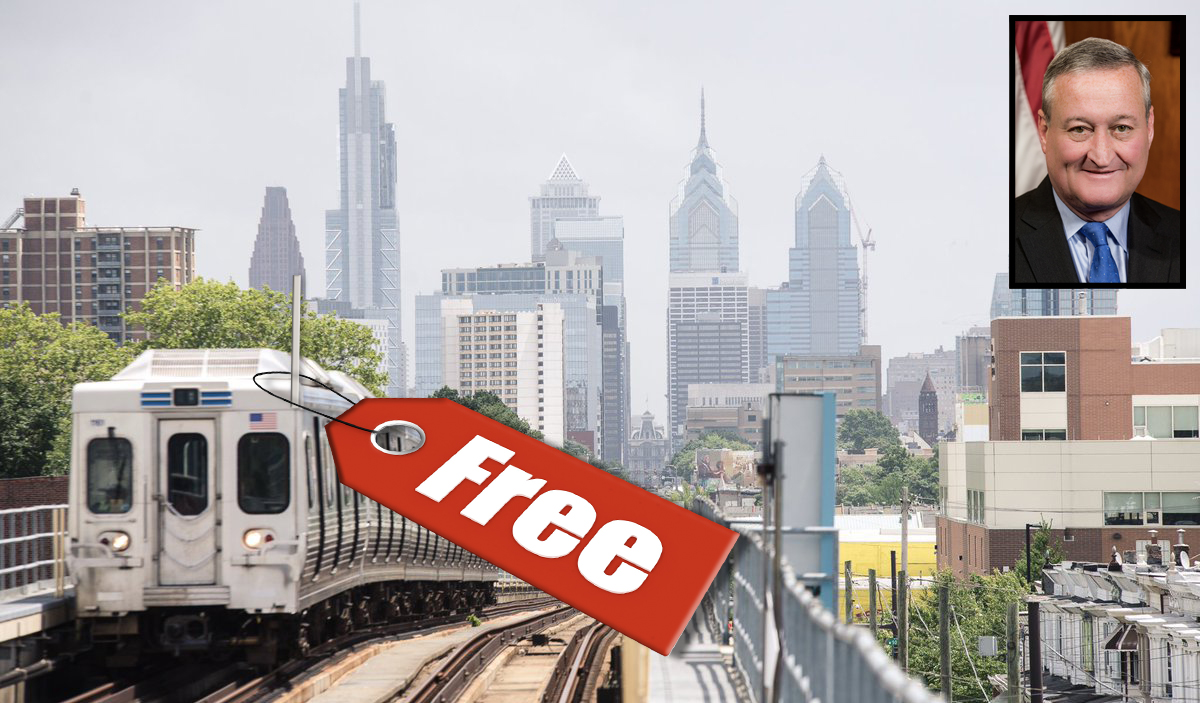The City of Philadelphia will spend $18 million over the next two years to give more than 22,000 public employees “all access” transit passes on SEPTA. It’s sure to be a boon for SEPTA ridership, the environment, and city employees’ quality of life, but can it last?
And can — and should — other cities follow suit?
The pandemic decimated transit ridership in most parts of the world, leaving cash-strapped transit agencies struggling with a worst case scenario: Low ridership means loss of farebox revenue, which can lead to service cuts, begetting even lower ridership, leading to more service cuts. And so on … until the so-called “transit death spiral” gets to the very bottom.
Philadelphia’s commitment to SEPTA won’t solve the $1.6-billion agency’s deeper fiscal problems, but Philadelphia’s Mayor Jim Kenney had other things on his mind — including filling more than 5,700 vacancies in the city government.
“This pilot is an opportunity to boost the city’s hiring and retention efforts, and support our goals of sustainability, traffic safety, and equity as well,” the Democratic mayor said in a statement.
Project manager Sandi Ramos is optimistic, given that more than half of the city’s eligible workforce had already registered in advance of the Sept. 1 launch. She thinks the program will make the city an employer of choice.
“[We] needed to support both our transit system and our employees,” Ramos said. “This is one way to increase recruitment, to bring new people in, and also to maintain retention, right? … It’s also a real equitable program in the sense that this is saving them money, right? So it’s money that they’re putting back into their communities. It’s money that they’re using to support their families. And so it’s really a win-win.”
Research dating as far back as the early 1980s would suggest that fare-free transit is an effective way to boost ridership, and in effect, combat the “death spiral.” But it takes more than just a mayor who wants to give employees a benefit. Complicating the effort is the fact that America’s transit systems are often multi-jurisdictional agencies overseen by state officials or a regional authority — so rolling out an analog to Philly’s program isn’t easy.
In Boston, Democratic Mayor Michelle Wu has long advocated for fare-free transit, but the city was only able to end fare collection on three bus routes serving “ transit critical” areas within the city borders — and that was thanks to $8 million in federal Covid-19 relief funds from the American Rescue Plan.
The program quickly showed promising results, but the city will need to negotiate with another municipal government and the state-run MBTA to expand fare-free service to the fourth most popular bus route in the region — because that route crosses into neighboring Cambridge.
Such jurisdictional barriers are only one possible problem. Systems that have multiple stakeholders often end up having multiple visions of best practices.
The City of Boston, Google, and other large Boston-area employers subsidize or cover transit costs for many of their employees through pay-per-use, MBTA Passport, and other programs similar to Philadelphia’s Key Access. The MBTA prefers passes to build ridership rather than eliminating fare collection.
“Unlike pass programs — which allow for system-wide access to multiple rapid transit lines and bus routes — a few fare-free routes are helpful to a much smaller group of people in a limited geographic area,” an MBTA source said. “The MBTA believes that continuing to make major investments in the transit system and improving service reliability are the best ways to attract more riders.”
Of course, maintaining and improving service is critical, but as cities plan for climate change on the local level, free transit for municipal employees seems a practicable intervention — the lowest-hanging fruit in any city that has a climate goal (all of them) and intends to meet it (um, not all of them). So getting all employees on transit is crucial … if the municipality can swing it.
The City of Boston employs 19,000 people and its most-conservative transit benefits package covers 65 percent of an MBTA transit pass. Larger cities like New York might struggle to implement a similar policy to support its 333,000 strong municipal workforce. A back-of-the-envelope price tag for that many unlimited MetroCards hovers just over (a likely prohibitive) $552 million.
Still, there are a dozen or more permutations of the models used in Boston or Philadelphia that could help cities negotiate their climate, transit, and civil service goals against jurisdictional and budgetary setbacks.
This is also a question of scale. In large part, Washington, D.C. government employees enjoy effectively fare-free use of WMATA — the agency that runs the region’s Metrorail and Metrobuses and is governed by D.C., Maryland, and Virginia — whether or not they live in the District. Where the City of Philadelphia hopes to stand out as an employer of choice in its regional job market, D.C. Council Member Charles Allen wants to scale that concept to the regional competitiveness of D.C. itself.
Allen, a Democrat, made headlines last year for his “Metro for DC” proposal, which would top up (but not roll over) every D.C. resident’s SmarTrip balance to $100 every month. The legislative framework for Metro for DC became law in April, but Allen says the post-pandemic crash in corporate property tax revenues halted its implementation. Still, Allen is optimistic about what transit incentives can do for cities.
“Transit costs are a massive part of your household budget,” Allen said in an interview. “If you can take that off the table for folks, that is a huge incentive to say, ‘That’s the employer I want to go with.’ … Philadelphia is competing against other regional employers, D.C. wants to be a location of choice. You can live in Maryland or Virginia, but I want you to live in D.C.”
The post Philly Gives City Workers Free Transit. Can Other Cities Follow? appeared first on Streetsblog New York City.






